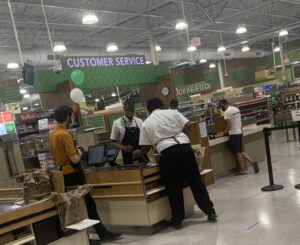
School is just one of the many stressors in students’ lives right now. Once you add the COVID pandemic and part-time jobs, that can bring on even more stress and anxiety. According to Georgetown University’s Center on Education and the Workforce, about 70 percent of all undergrad students work at least a part-time job. The majority of those jobs are considered to be “essential” and often attract low-income students.
Faith Epley, a student at TCC and an employee at Sam’s Club, is one of many students who need to work in order to pay monthly bills like rent and car payments and other day-to-day activities.
“I have no choice but to work. My parents live out of state and I have to support myself,” she said.
Epley said she would not work during COVID if she did not have to.
Beyond stress, students face considerable anxiety when they are considered an “essential worker” during the pandemic. They are at a much greater risk of being in contact with the virus and contracting it.
Linda Pan, an FSU student who works at Walmart, said,“Its a very scary time right now as an essential worker. We’ve had a confirmed case by an employee and there’s a possibility they could’ve passed it to someone.”
It is nearly impossible to social distance when you work in retail or food service. Though the state was shut down temporarily, many stores like Target, Walmart, and Publix that were deemed “essential” were still busy.
“When COVID first broke out, we were still busy. It’s like everyone decided to come into Walmart because they had nothing better to do,” Pan said.
The number of positive COVID cases is steadily rising, with no end anytime in the near future. Governor DeSantis has adamantly said he will not go back on his reopening plan and shut down the state again.
Ahlayja Robinson, a FAMU student who works at Costco, said, “Its a very stressful time to be working. My job is also busy and I have little time to focus on my summer classes.”
She believes the only way to end COVID is by shutting everything down completely.
Some students agree with her sentiment about a national shutdown. “I think all areas besides essential sections of stores should be closed to customers,” she said.
Epley said, “I don’t even think customers should be allowed in stores. We should be reduced to curbside only.”
Going forward, it is uncertain what sort of protection employers and the government will put in place to protect essential workers.